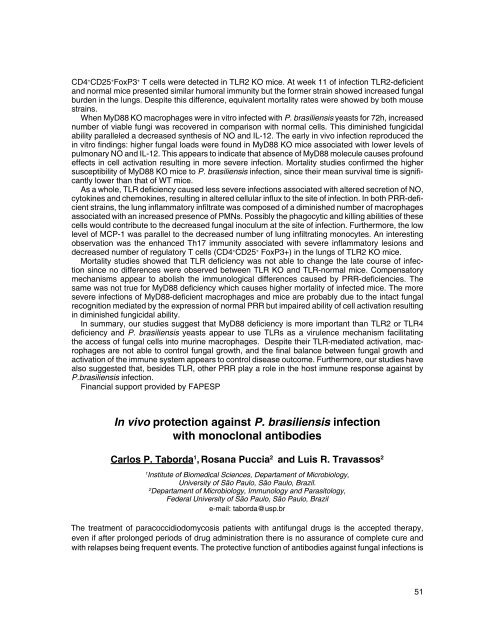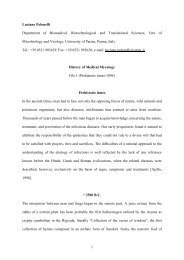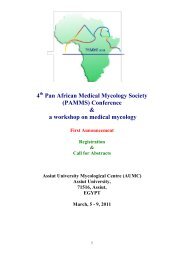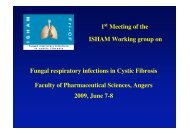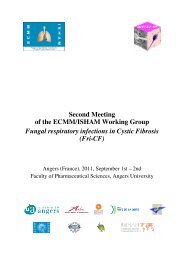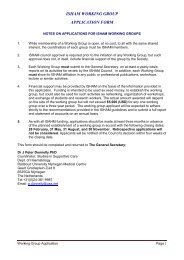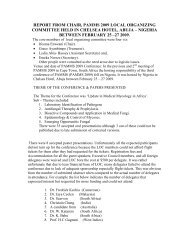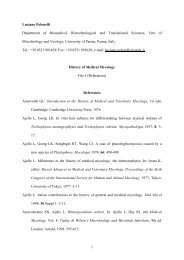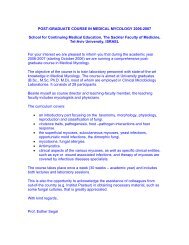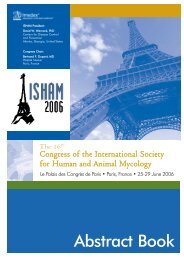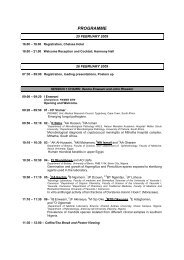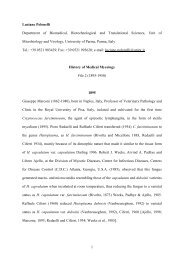Memoria CD.indd - ISHAM
Memoria CD.indd - ISHAM
Memoria CD.indd - ISHAM
You also want an ePaper? Increase the reach of your titles
YUMPU automatically turns print PDFs into web optimized ePapers that Google loves.
<strong>CD</strong>4 + <strong>CD</strong>25 + FoxP3 + T cells were detected in TLR2 KO mice. At week 11 of infection TLR2-deficientand normal mice presented similar humoral immunity but the former strain showed increased fungalburden in the lungs. Despite this difference, equivalent mortality rates were showed by both mousestrains.When MyD88 KO macrophages were in vitro infected with P. brasiliensis yeasts for 72h, increasednumber of viable fungi was recovered in comparison with normal cells. This diminished fungicidalability paralleled a decreased synthesis of NO and IL-12. The early in vivo infection reproduced thein vitro findings: higher fungal loads were found in MyD88 KO mice associated with lower levels ofpulmonary NO and IL-12. This appears to indicate that absence of MyD88 molecule causes profoundeffects in cell activation resulting in more severe infection. Mortality studies confirmed the highersusceptibility of MyD88 KO mice to P. brasiliensis infection, since their mean survival time is significantlylower than that of WT mice.As a whole, TLR deficiency caused less severe infections associated with altered secretion of NO,cytokines and chemokines, resulting in altered cellular influx to the site of infection. In both PRR-deficientstrains, the lung inflammatory infiltrate was composed of a diminished number of macrophagesassociated with an increased presence of PMNs. Possibly the phagocytic and killing abilities of thesecells would contribute to the decreased fungal inoculum at the site of infection. Furthermore, the lowlevel of MCP-1 was parallel to the decreased number of lung infiltrating monocytes. An interestingobservation was the enhanced Th17 immunity associated with severe inflammatory lesions anddecreased number of regulatory T cells (<strong>CD</strong>4 + <strong>CD</strong>25 + FoxP3+) in the lungs of TLR2 KO mice.Mortality studies showed that TLR deficiency was not able to change the late course of infectionsince no differences were observed between TLR KO and TLR-normal mice. Compensatorymechanisms appear to abolish the immunological differences caused by PRR-deficiencies. Thesame was not true for MyD88 deficiency which causes higher mortality of infected mice. The moresevere infections of MyD88-deficient macrophages and mice are probably due to the intact fungalrecognition mediated by the expression of normal PRR but impaired ability of cell activation resultingin diminished fungicidal ability.In summary, our studies suggest that MyD88 deficiency is more important than TLR2 or TLR4deficiency and P. brasiliensis yeasts appear to use TLRs as a virulence mechanism facilitatingthe access of fungal cells into murine macrophages. Despite their TLR-mediated activation, macrophagesare not able to control fungal growth, and the final balance between fungal growth andactivation of the immune system appears to control disease outcome. Furthermore, our studies havealso suggested that, besides TLR, other PRR play a role in the host immune response against byP.brasiliensis infection.Financial support provided by FAPESPIn vivo protection against P. brasiliensis infectionwith monoclonal antibodiesCarlos P. Taborda 1 , Rosana Puccia 2 and Luis R. Travassos 21Institute of Biomedical Sciences, Departament of Microbiology,University of São Paulo, São Paulo, Brazil.2Departament of Microbiology, Immunology and Parasitology,Federal University of São Paulo, São Paulo, Brazile-mail: taborda@usp.brThe treatment of paracoccidiodomycosis patients with antifungal drugs is the accepted therapy,even if after prolonged periods of drug administration there is no assurance of complete cure andwith relapses being frequent events. The protective function of antibodies against fungal infections is51


